Glyph 2015 will be unveiled at the Glyph Gala, 7 p.m., Tuesday, May 5 in O’Shaughnessy Performance Center, with readings, music and refreshments.
Preview: “Borders”
posted by Zoe Baillargeon
“What is a border? Is it meant to keep in or keep out?” This question and many more are explored in the not-to-be-missed new production of “Borders: Crossing the Line,” opening tonight April 30 at 7 p.m. at Warehouse 21 and running through May 2.
Q/A w/ Jade Parks
posted by Nick Martinez
Jade Parks, Michaela Rempel and Adriel Contreras wrap up the CWL Senior Reading series at 7 p.m., Tuesday April 28, 2015.
Q/A w/ Adriel Contreras
posted by Nick Martinez
As a part of an ongoing Q&A session with the Creative Writing and Literature Department’s Senior Reading Class, Jackalope Magazine sat down with Adriel Contreras. Contreras discussed drawing, the inspiration he draws from his father, and Gabriel Garcia Marquez.
Q/A w/ Michaela Rempel...
posted by Nick Martinez
As a part of an ongoing Q&A session with the Creative Writing and Literature Department’s Senior Reading Class, Jackalope Magazine sat down with Michaela Rempel. Rempel discussed “Nighthawks,” never turning off her brain and played MFK with science fiction giants.
Dana Levin Departs
posted by Nick Martinez
The woman, the poet, the teacher: Jackalope Magazine talks to departing CWL co-chair Dana Levin about her tenure with the department, as well as the colleagues and students who will miss her.
Q/A with Bailey Schaumburg...
posted by Nick Martinez
As a part of an ongoing Q&A session with the Creative Writing and Literature Department’s Senior Reading Class, Jackalope Magazine sat down with Bailey Schaumburg. Schaumburg discussed sass, self aware poetry and poet-lady sex. Schaumburg reads with Mark Feigenbutz and Leticia Gonzales at 7 p.m., Tuesday, April 21 in O’Shaughnessy Performance Space. Jackalope Magazine: How dare you? Bailey Schaumburg: I like to throw sass back when I get the sass. It’s like sass softball. JM: How did you get into writing? BS: I’ve always liked writing, but I took a creative writing class in high school and just loved it. JM: What genre do you work in and why? BS: Poetry. (awkward pause) JM: OK, do you work in other genres as well? BS: Not really. I like to pull things from other genres into my poetry. Or try to. I fail miserably sometimes. I’d say fiction actually has helped me most, because it helps to tell lies. JM: What three words would you use to describe your writing? BS: Uhh. The only three words that comes to mind are: bloody, shitty and badass. (laughs) JM: What’s the worst thing you’ve ever written? BS: One time I wrote a poem about writing poems that was really self aware. It was horrible. It was sappy, maudlinesky as Dana [Levin)] would say. It was called the “Poem Poem” or something like that. It was bad. JM: How do you balance work and family? BS: Yeah, I have a daughter named Calypso. Not really. I don’t very well. JM: Marrry, Fuck, Kill: Sylvia Plath, Gertrude Stein, Ashton Kutcher. BS: Oh God. Fuck Sylvia, Marry Ashton, Kill Gertrude Stein. Sylvia and I would have crazed poet-lady sex!...
The Young Professionals
posted by Luke Montavon
The Young Professionals was the second of four senior readings through SFUAD’s Creative Writing and Literature Department.
Q/A w/ Nick Martinez
posted by Jacey Ellis
Jackalope’s ongoing interview series with members of CWL’s senior reading class continues: This week, Nick Martinez in advance of the 7 p.m., April 14 senior reading.
The Credibility of Fan Fiction
posted by Charli Renken
Fan fiction is defined as fiction written by fans of TV series, movies or books that includes the characters of the original stories. Widely popular online, fan fiction is an area in which it seems like just about every fan has dabbled at least once or twice. Fan fiction also is a integral part of fandom communities (world wide groups of fans), and has been around since the popularization of it in 1960’s in Star Trek fanzines such as Spockanalia (1967.) Fan fiction certainly has its fans and practitioners in the Creative Writing and Literature Department, as was demonstrated recently when Amaya Garza, sophomore Creative Writing major, lead a Student Writer’s Association workshop on fan fiction. “It’s been my sort of weird dream to teach a fan fiction class,” she says with a laugh. Garza strongly believes that every writer should write or at least take a serious look at fan fiction. “Fan fiction is a useful tool to train a writer in characterization and consistency. I have always been very passionate about characters and…you have to really care about the characters you write about…So when you write fan fiction and you have to take someone else’s character and treat it as your own little thought baby and cradle it and take care of it, it kind of helps you form that bond and you can later transfer that bond to your own characters,” Garza explains. One aspect of writing fan fiction writers struggle with is keeping their versions of the characters in line with the canonical personalities. Garza believes that writing fan fiction and forcing oneself to keep truthful to a character’s essence is good practice for one’s own writing. Creative Writing freshman Chantelle Mitchell agrees with Garza. She believes fan fiction is especially helpful for screenwriting and collaborative work. “…Taking a character that’s not your own and being able to do it justice and stay true to the character while writing is an important skill to have just because in the professional world you won’t always be writing your own characters. If you’re working on a collaborative project or a screenplay or a TV show, somebody else created those characters and you have to be able to write them true to who they are as people. I think fan fiction is a good way to practice that.” Novelist and Creative Writing faculty member James Reich, however, cautions students about writing fan fiction. “If the world you write into isn’t public domain—broadly, pre-1923—you may be wasting your time,” he says. “You could call it a learning environment, but I don’t think it’s a sufficiently challenging one for a serious writer.” Fan fiction fans are aware of its critics. At her seminar, in fact, Garza asked attendees to list the things they didn’t like about fan fiction. What she found was that very few of the characteristics mentioned were exclusive to fan fiction but were rather simply elements of bad writing. “Whenever fan fiction gets a bad reputation it’s because use of cliché, bad diction and bad syntax, poor characterizing…these are all the things that people complain about but when you take a look at it in a list you realize that it’s just the elements of bad writing,” she says. It’s not that fan fiction writers aren’t good at what they do, but rather that a lot of people write fan fiction and a lot of people don’t know how to write well in general. Not everyone has a gift for literature or have the opportunity to study writing at a university. “It’s easier to blame an online community that you don’t know than to say that publishers will publish bad writing.” Reich, however, points out his concerns about the medium itself. “My anxiety about fan fiction… is that, apart from the impossibility of publishing it offline without risking a legal suit, it exists in a vacuum of wish-fulfillment and weak writing that the Internet...
Q/A w/ Drake Blais
posted by Nick Martinez
Jackalope Magazine continues its Q&A series with members of the Spring 2015 Senior Reading class.
Q/A w/ Veronica Menne...
posted by Nick Martinez
Veronica Menne, one of the three senior readers for the April 7 kickoff Senior Reading answers our weekly questions.
Q/A w/ Schuyler Hall Gilmore...
posted by Nick Martinez
Jackalope Magazine continues its ongoing Senior Reading series. This week: Schuyler Hall Gilmore.
Spoon Fed
posted by Nick Martinez
There was no order. Invitations—spoons—were left in Susanne Miller’s office for any curious party. The menu consisted of Quiche, Chicken Wings and Peeps. The more than 20 students who showed up weren’t sure what was in store for the night—sometimes even the event organizers weren’t sure. In other words, the March 31 celebration of Coffee Spoons in O’Shaughnessy Performance Space was quintessential Creative Writing Department. Coffee Spoons, the little loved online literary magazine, was started as a direct response to Glyph. One of its founders, Brandon Brown, views it as a place where all students, regardless of majors, can get their work out there for the world to see. But, in the magazine’s short existence, very few have paid attention. “It’s been hard this semester,” he said, citing the hectic schedule of the typical SFUAD student and a lack of a solid marketing plan. Regardless, Brown, Melinda Freudenberger, Marina Woollven, Amaya Garza and Serafima Fedorova, the Coffee Spoons staff, continue working. Each staff member wears many hats; between proofing, publishing, web design, event planning and peer editing, everyone does everything. “A lot of frazzled meetings,” Freudenberger admits. The Coffee Spoons event was meant to get more people talking about the magazine, but for Brown, it was mostly about bringing people together. “The whole deal is to get people in a room talking,” he said. “Maybe I’m a sap, but that’s how I feel.” Freudenberger agreed. “There is a sense of secrecy in the writing department,” she said. “Which is unnecessary. Other majors don’t have that fear.” No one at the event had that fear. Attendees were given a physical handmade copy of The Coffee Spoon, a collection of the first two issues from the website, and many gave readings. Writing majors Andrew Koss and Charles Simon, with...
Q/A w/ Leticia Gonzales...
posted by Nick Martinez
In an ongoing series of interviews with SFUAD CWL Senior Reading Class members, Jackalope interviews Leticia Gonzales.
Q/A w/ Mark Feigenbutz...
posted by Nick Martinez
As a part of an ongoing Q&A session with the Creative Writing and Literature Department’s Senior Reading class, Jackalope Magazine sat down with screenwriter Mark Feigenbutz. Feigenbutz discussed bad poetry, bears and dead comedians. Jackalope Magazine: How dare you? Mark Feigenbutz: How dare I? How dare I not? JM: How did you get into writing? MF: I started writing poetry when I was, like, 6th grade. I was not 6th grade, I was 13. JM: What genre do you work in and why? MF: Pretty much exclusively comedy at this point. If I don’t have funny elements in something, it just doesn’t ring true. After poetry, I got into stand-up comedy, and started writing bits. When I was in L.A. I had to sell my motorcycle, and I couldn’t do comedy anymore, so I started screenwriting. JM: What three words would you use to describe your writing? MF: My writing in three words? Bear. (laughs) JM: Like B-A-R-E? MF: No, like a grizzly. Bear. Machine. Uhh, squeek. JM: What’s the worst thing you’ve ever written? MF: Probably my early poetry, when I first started writing. I didn’t know anything about poetry, so I thought everything had to rhyme. It was pretty embarassing, very morose and melodramatic. JM: Do you have a piece in mind? MF: (long pause) Yeah. Yes, I do. JM: How do you balance work and family? MF: I try to work as little as possible, and it’s going really good. JM: OK, now it’s time for the dead stand-up edition of Marry, Fuck, Kill. Bill Hicks, George Carlin and Mitch Hedburg. MF: Marry George Carlin, Fuck Bill Hicks and Kill Mitch Hedburg, as difficult as that was. Bill Hicks is fucking Jesus, and I...
Q/A w/ Jacey Ellis
posted by Nick Martinez
As a part of an ongoing Q&A session with the Creative Writing and Literature Department’s Senior Reading Class, Jackalope Magazine sat down with Jacey Ellis. Ellis discussed lying to herself, scrumtrulesence, and played a special British Invasion version of Marry, Shag, Kill.
Q/A w/ Brandon Brown
posted by Nick Martinez
Q/A with Creative Writing and Literature senior Brandon Brown
Matt Bell Visit
posted by Nick Martinez
Writer Matt Bell visits SFUAD’s Creative Writing and Literature Department for its visiting writer series.
Playwriting: Crossing the Border
posted by Nick Martinez
What are the borders in our lives? The physical, psychological borders that strain our society? That is the central question SFUAD’s playwriting class hopes to answer in its spring production of Borders: Crossing the Line. Dale Dunn and Lynn Goodwin are in their second year of teaching playwriting, a class that started as an independent study. But, the duo felt the craft of playwriting deserved a more permanent home in SFUAD’s curriculum. “It’s a wonderful outreach project for the university,” Dunn said. In the class’ first year, Dunn and Goodwin produced Left to Our Own Devices: Staying Connected in the Digital Age. It was performed off campus at Warehouse 21. “When we performed last year a lot of people came up and said ‘well I’ve never seen anything by the university,’” Dunn began. “A lot of people hesitate to come out to the campus, but having the show in downtown Santa Fe opens up access to a lot of different audience members who were thrilled to see the variety of students that we have here, and hear their different opinions of what’s going on.” The production was performed in partnership with students from the New Mexico School for the Arts, a performance high school in Santa Fe. They plan to continue the collaboration this year as well. When asked if some of the dark, adult subject matter was too much for high school students, Goodwin was dismissive. “Oh no,” she said. “Sometimes they’re worse than you guys.” Goodwin and Dunn were well aware of the tumultuous times we are living in, which heavily informed their opinion for this year’s subject: borders. Between foreign soil struggles, like ISIS and the Israeli-Palestinian conflict, as well as domestic court cases that highlight our current racial tension, the duo felt that a nuanced look at universal division was needed. “[We want] students to see where they are, and feel like they have a voice in the world, that their voice is heard,” said Goodwin A typical class starts with a discussion on a play students read for homework. The plays vary from classics like A Streetcar Named Desire, to untraditional plays like The Laramie Project and Ajax in Iraq. This transitions into a general discussion of craft, often using other plays as examples. Lastly, a significant portion of class time is spent writing and workshopping pieces. One of Dunn and Goodwin’s favorite aspects is the diversity of voices in the classroom, with majors ranging from Creative Writing to Music, Performing Arts to Film. “We’re always surprised by the shape that it takes, because of everyone’s different point of view,” said Goodwin. Santa Fe will have to wait until early May to see just what those different opinions are....
2015 Glazner Contest Winners
posted by admin
With students from 87 high schools across the country submitting 140 entries to the 2015 Glazner Prize for Creative Writing, competition was fierce. This year’s winners were announced this week, chosen by SFUAD’s Creative Writing and Literature Department co-chairs Matt Donovan and Dana Levin. Named for the founder of the Creative Writing Program, Greg Glazner, the Glazner contest was conceived as a way to engage creative writing high school students across the country with SFUAD’s Creative Writing Department. Winners receive publication of their award-winning writing in Jackalope. Additionally, the first place winner receives an iPad with retina display; second place receives a Kindle Fire; and third place receives a $50 Amazon gift card. And the winners are… Alexandra Spensley is a junior at Avon Lake High School in Ohio. She was named a finalist in the Sierra Nevada College High School Writing Contest, and her recent work has appeared or is forthcoming in Cadaverine, The Postscript Journal, Canvas Lit, and Crashtest. Her writing has also received recognition from the Live Poets Society of New Jersey and Vincennes University. Read her award-winning piece, “Portrait of a City.” Joseph Jordan-Johnson is a senior at Oak Park and River Forest High School in Illinois, who says she doesn’t take herself “very seriously—I’m not entirely sure if this is good or bad. I enjoy long walks on the beach and effective discourse on racial equality in America. I believe the written word is the most raw form of communication, stripping narratives of the language that makes them whole, and creating art within the shells you made. Also, I’m irrationally in love with Beyonce.” Read his award-winning piece. “Hair.” Emily Zhang is a high school junior from Richard Montgomery High School in Maryland. Her writing has been recognized by the Scholastic Art and Writing Awards, the Poetry Society of England, the Sierra Nevada Review, and Princeton University. She enjoys watching reality television. Read her award-winning piece, “History of Navigation.”...
Q/A w/ Zoe Baillargeon...
posted by Nick Martinez
As a part of an ongoing Q&A session with the Creative Writing and Literature Department’s Senior Reading Class, Jackalope Magazine sat down with Zoe Baillargeon. Baillargeon discussed hashtags, learning to be funny and late night television hosts. Jackalope Magazine: How dare you? Zoe Baillargeon: I just do. You know? I am me. JM: How did you get into writing? ZB: I was originally a writer as a little girl, and then I got sidetracked by theater. Then during a study abroad, I realized I didn’t want to be in theater anymore, I wanted to be a writer. JM: What genre do you work in and why? ZB: Usually fiction but I’m going into nonfiction at the moment. I just think that fiction was easier to start off in. I never really considered myself a poet. In nonfiction I just felt like my life wasn’t interesting enough; then I learned how to be funny. Then, I learned how to put a twist on my life. JM: What three words would you use to describe your writing? ZB: Quirky, sarcastic and off the wall. JM: What’s the worst thing you’ve ever written? ZB: A story written entirely in hashtags about a basic bitch owning a bonsai tree, and she chronicles that on Twitter, and basically ends up killing the tree. JM: Why was that the worst thing you ever wrote? ZB: Because it was written entirely in hashtags! (laughs) It was an experiment. JM: How do you balance work and family? ZB: Lots of stress. There’s not really balance at the moment. JM: Marry, Fuck, Kill: Jimmy Fallon, Stephen Colbert and Jon Stewart. ZB: Oh man. Fuck Jon Stewart, because hell yeah. Marry Jimmy Fallon and I guess...
Hangin’ w/ SWA
posted by Nick Martinez
Twelve writers sat in a circle on couches or chairs, under dim lighting. They chatted about classes, favorite authors, weird things they wrote or wanted to write. Student Writers Association’s Jan. 27 meeting resembled a coffee shop more than a classroom. “The quiet, comfortable atmosphere is what makes this group so successful,” said Creative Writing major Amaya Hoke. She noted that part of the growing success of the often ramshackle organization was the switch from a boring Benildus classroom to the O’Shaughnessy Performance Space. Senior Brandon Brown has attended every SWA meeting, seeing his role as more of an advisor than a president. “This is about building a foundation,” he said when asked about the group’s goals. Of the 12 in attendance, most were underclassmen, a demographic that is key to establishing the group’s future. The laid-back vibe of the meeting is deliberate. Brown saw that establishing a connection with other writers, who are usually a solitary lot, is just as important as any craft exercise. “You can make friends. You’ll see someone walking in the hallways and say, ‘Hey, I know that person, because I hang out with them for two hours every Tuesday night,” he said. “I feel like it works. [The meetings are] always easy, it never feels like a chore.” Missing the intellectual stimulation, recent graduate Curtis Mueller started attending meetings last November. “We’re really spoiled here,” he said. “Here, people are talking about things they actually want to do. Out in the real world they just want to talk about stupid bullshit.” Though the group is informal, Hoke organizes a writing exercise every meeting meant to remove the writers from their comfort zone. Some are structurally complicated, like a three paragraph flash piece that changes genres each paragraph. Others...
Leticia Gonzales’ Senior Show
posted by Nick Martinez
Leticia Gonzales hasn’t always known her niche. “The first thing I wanted to do was dance,” she said. “Then sing. Then I wanted to join a Mariachi group and wanted to play trumpet, but I couldn’t play trumpet. Then I wanted to play bass, but I couldn’t play bass. So it was guitar or violin, and guitar is fucking stupid.” Tonight at 7 p.m., Gonzales will be performing her senior show featuring nine musical selections from various nations ranging from America to Macedonia, Ireland to Guinea. She will showcase her talents on vocals, violin and three African drums (Dununba, Sangban and Kenkeni). But organizing the event, and performing in front of a crowd was the last thing she wanted to do. Gonzales grew up listening to American Folk music, and when she enrolled at University of New Mexico, music seemed to be the natural choice. But its program was too confined for her musical curiosity. Faith renewed when she transferred to SFUAD and discovered its Balkan and African drum ensembles. “The only way I can talk about why [I like Balkan and African music] is that I heard it and it spoke to me,” she said and that seems to be a running theme. Along with being a music major, Gonzales is also working toward a minor in writing, something she considers her true passion. “Writing would be the vessel,” she said. “ And inside of that is music, textiles, philosophy, language and everything else that makes me excited about living.” Caitlin Brothers, Gonzales’ friend and musical partner, sees her experience as a writer seeping into her senior show in the arrangement of music, and spoken word selections. “I feel like she’s organized the show almost how one would arrange a poem,” she said. “It feels like being a part of a nine point poem.” Brothers and Gonzales perform with each other often, including as part of their band Storming The Beaches With Logos In Hand. They also share the connection of both being women in a predominantly male department. “Having a conversation without being listened to, is bearable sometimes,” said Brothers. “Trying to play music with someone who isn’t listening to you—you can’t fucking do anything, We found each other as people who can listen to one another. She knows I’ll listen to her, and I know she’ll listen to me.” In part to Gonzales’ distaste for singing publicly, and the duo’s musical compatibility, Gonzales acknowledges that her show would be lost without Brothers’ contribution on percussions and vocals. “When I was considering African rhythms and singing the tunes that I’m singing, the only way that I thought that would come to fruition was if I imagined Caitlin doing them with me,” said Gonzales. She is self-deprecating, nervous about applying make-up for the camera, but it is clear with her attention to detail in writing, and dedication in learning new music, that Gonzales knows what she is doing. “I’m hoping that in presenting things in a methodic and tight woven way, there will be an hour where everybody in the same room is connecting in the same way, on a winter night,” she said. Along with Gonzales and Brothers, the show also features collaborative composition between Gonzales and Sam Armstrong Zickefoose, as well as Bailey Schaumburg reading a selection from Italo Calvino’s “Invisible Cities.” Gonzales requests that there be no cell phones or photography, and that you hold all applause until the end. Leticia Gonzales Senior Show O’Shaughnessy Performance Space 7 p.m. Free...
Q/A: Emily Kendal Frey
posted by Charlotte Martinez
Poet Emily Kendal Frey discusses form, grief and tricks for writers when they’re stuck.
NaNoWriMo at SFUAD
posted by Zoe Baillargeon
No writer’s block here! For the month of November, 18 SFUAD students are combating writers’ infamous procrastination by signing on to participate in National Novel Writing Month. More commonly referred to as NaNoWriMo, National Novel Writing Month began in 1999, and has since grown into a nonprofit organization with a global following. Aspiring novelists can sign up on the NaNoWriMo website, track their daily progress and average word counts, and connect with other writers for motivation and communal support. The goal? A 50,000 word novel by 11:59 pm on Nov. 30. “My daily average is about 1,600 words a day,” says freshman creative writing major Charlotte Renken, one of the admins on the SFUAD NaNoWriMo Facebook page. This is her third year participating in the event. “It’s going great so far,” she enthuses, dishing the dirt on her project this year, which involves a vegan surviving the zombie apocalypse, and is her first foray into humor writing. Nicholas Thomas, a fellow scrivener, sees NaNoWriMo as a stepping stone toward working on his larger project, a multi-book exploration of the world of Eldali. “This is just a springboard, I’m gonna keep working on it, but it (NaNoWriMo) is a great way to get shit done!” says Thomas, who, a huge fan of the works of J.R.R. Tolkien, has been developing the fantasy world saga and its inhabitants for several years. Opinions on NaNoWriMo’s effectiveness and usefulness are divided, with many proponents saying it’s an effective tool for pumping out a first draft, no matter how bad, while others believe it puts undue stress on writers and therefore undermines the writing process and the work being produced. “NaNoWriMo epitomizes the desires and the impatience of instant culture,” says James Reich, a faculty member in the Creative...
Coffee Spoons Launches
posted by Zoe Baillargeon
It’s a chilly Tuesday afternoon as the staff members of SFUAD’s newest student-run online literary magazine Coffee Spoons converge on an upstairs room in Benildus Hall, shedding coats and cracking open laptops to discuss the game plan for the upcoming week. Only one submission has been made to the website so far and the staff kicks into high gear, brainstorming ways to further promote the website. “We’re hoping to accomplish a wider exposure for all writers on campus,” says Melinda Freudenberger, one of the editors, speaking of the purpose of Coffee Spoons. “We wanted something more accessible than Glyph, because Glyph is once a year and this is every month, so students have the opportunity to turn in newer work. But just as high quality work!” Amaya Hoke agrees. “We want to inspire the student body to start submitting. The idea of submitting is kind of scary, so if they can start by submitting to a student-run online magazine, it might be easier for them to submit elsewhere.” The online magazine will accept any genre of writing, as long as it is “original and coherent” according to the Coffee Spoons FAQ page, and is open to all SFUAD students, not just the Creative Writing and Literature department. “Our only chance to put work out is Glyph whereas other departments have lots of opportunities to put their work out there such as plays and film festivals, and workshops can only take you so far,” says Josiah Farris, the mastermind behind the project. “I really got committed to the idea of trying to find a way for us to find ways to get our work out there more frequently.” Although creative writing students are encouraged to submit their work elsewhere, the primary means of student publication within the department are Glyph, a yearly lit-mag written, edited, and promoted by students, and Jackalope Magazine, the weekly online magazine where students can explore journalism. The Coffee Spoons staff hopes students will be encouraged to submit due to the fast turn-around rate, the fact that submitting work for consideration is free, and that any published works may be resubmitted to “any other magazine that will accept it.” At present, the staff of Coffee Spoons includes Brandon Brown as coordinator, with Josiah Farris, Zoe Baillargeon, Marina Woollven, Serafima Fedorova, Freudenberger, and Hoke as editors. The meeting flip-flops between business and dissolving into giggly side conversations, the staff clearly having a great time working together. Farris jokes around, telling a story of how a teacher literally burning a bad essay in front of his class inspired him to become a writer. The tale sparks laughs from around the room and Brown attempts to get the meeting back on track. Once attention is redirected, everyone is engaged in presenting ideas and opinions for how to further promote the website. The name “Coffee Spoons”comes from a stanza of the T.S. Eliot poem “The Love Song of J. Alfred Prufrock,” the exact quote being “I have measured out my life with coffee spoons.” Hoke got the idea from reading the poem in Dana Levin’s 20th Century American Poetry class, replacing Farris’s original title of “A Sudden Jabberwocky.” Each member of the staff has their own reasons for wanting to be involved in the process of editing and promoting student work. “I am always really excited and really looking forward to reading what the department and students come up with,” says Marina Woollven. Freudenberger agrees, saying that she “loves the process of editing, I’m really passionate about it, and giving a wider voice to the community.” Interested students may submit work the first week of every month. If their work is accepted, students can expect a response within two weeks of publication. The overall issue will be released at the end of each month. Currently, the deadline for the November 2014 issue ends on Friday, Nov. 14, allowing students plenty...
Craft Sells
posted by Jonathan Hargraves
Local marketing gurus Zane Fischer and Adam Shaening-Pokrasso schooled writing students Nov. 5 in the Forum on the commodity of story telling. “It’s hard to find careers where writing doesn’t come into play,” Fischer said. Fischer wrote, and was an editor for the Santa Fe Reporter. He now applies his penchant for narrative structure to re-branding local businesses from his Santa Fe-based firm Anagram, which has created logos and websites for the new media festival Currents, the contemporary art gallery Site Santa Fe and the Santa Fe Concert Association — rebranded by Anagram as Performance Santa Fe. Now more than ever before, according to Fischer, a creative writing degree will allow one to assimilate almost immediately into a professional marketing environment. “Your contribution will be valued,” Fischer said. Shaening-Pokrasso, born in Santa Fe and founder of the California-based marketing firm 12FPS, attributes this valuation to a change in how the advertising audience connects to products and the ideas they represent. “People are tuning out in-your-face marketing techniques,” he said, adding, “People want stories.” Story building is the foundation for all 12FPS-marketing campaigns, and writers, according to Shaening-Pokrasso, are the ones with the conceptual chops necessary to turn an abstract notion into a hand-held commodity with mass appeal. Industry demand for writers’ craft is a new idea for art students, especially those who question, or may even be unaware of the relevance of writing craft in a tech-driven economy. In high school, film major Julie Wittrock said she considered pursuing a BA in creative writing, but decided against it because of “how hard it is to apply creative writing to general employment and hire-ability.” But after hearing the guru duo speak, she said she was surprised by the openness of the marketing industry to “creative people and storytellers.” However, industry openness did not alleviate Wittrock’s anxiety about getting a job after graduation. She wants to be a screenwriter, not a marketing executive, and is partial to science fiction — a traditionally male-dominated genre. “Being a writer in any capacity is a huge risk,” Wittrock said, “[and] making a living is a huge frightening issue for me.” Wittrock’s fear is not unfounded. According to the Labor Department’s Occupational Outlook Handbook, writing is projected to grow at a rate of a little less than three percent in the decade between 2012 and 2022. In other words, only 3,800 additional writing jobs are expected to become available over the course of 10 years. However, according to Career Services Director Joanie Spain, this number may be based on the Labor Department’s narrow definition of writing, and their limited perception on its applicability to other industries, rather than the actual number of jobs available to people with a creative writing degree. “That’s why we brought in Zane and Adam,” Spain said, “to show writing students the wide range of possibilities.” Marketing is a burgeoning industry, according to the Labor Department, that’s projected to grow 12 percent during the same decade as writing, which is one percentage point higher than the average for all industries combined — a fact Spain attributes to marketing being the third largest industry after health care at No. 2, and transportation at No. 1. “No matter what you do,” Fischer said, “you have to be able to communicate what you do, and who you are.” Success in industry, according to Fischer and Shaening-Pokrasso, depends on good communication, at the core of which is the ability to formulate cohesive and comprehensive narratives. “At the end of the day,” Fischer said, “employers want a good...
The Poet’s Guide to Journalism
posted by Jonathan Hargraves
On Oct. 14, Tom Sleigh, a noted poet, read excerpts from his most recent collection of poems — “Station Zed” — to a crowded O’Shaughnessy Performance Space at Santa Fe University of Art and Design. The collection is part of a new body of work by Sleigh inspired by his recent travels to the Middle East. In addition to the poems, Sleigh journalized the experience in an essay titled “The Deeds” in which Sleigh casts himself as a poet in journalist’s clothing, seeking passage to the Lebanese city of Qana in order to learn the Palestinian side of the 2006 Israeli-Palestinian conflict. “I loved doing it,” Sleigh says, “I didn’t think about myself…all doubts immediately vanished… [and] there was no detail too small that wasn’t suddenly charged with interest.” “The Deeds” was published in the Virginia Quarterly Review in 2008, and selected for inclusion in the 2009 edition of the “Best American Travel Writing” compendium. However, before this acclaim Sleigh says he had no desire to go to Lebanon — adding, as a joke, that he barely knew where to find it on a globe. “What I didn’t know about Lebanon could fill many books.” In 2007, Munir Akash invited Sleigh to Lebanon. Akash is the founder of the Trans-Arab Unity Foundation, and Sleigh’s invite was part of an initiative by the group to bring artists and writers to the Middle East. Sleigh says Akash wanted him to assess and write about the conditions of Palestinian refugees, “particularly in the aftermath of the 2006 war.” Originally, the trip was postponed for three months, Sleigh says, because of backlash from the murder of “a very prominent Christian Maronite politician” — Plerre Gemayel. According to the trans-Arab news network Al-Jazeera, the cabinet minister was gunned down in his car during a traffic jam in a Christian neighborhood — almost immediately his death was followed with “angry protests” by his supporters. Though unsettling for Sleigh, an assassination turned out to be the least of his worries. “As soon as we landed,” he says, “a huge car bomb went off.” In Lebanon, Sleigh says car bombs are so frequent that while watching Abbott and Costello’s “Meet the Mummy” in a Beirut hotel room, he saw commercials for personal bomb-detecting devices — an experience upon which he elaborates in “The Deeds.” During his visit, the violence only escalated. Sleigh says he experienced some of the worst internal violence since the 15 years of civil war that took place in Lebanon between 1975 and 1990. “People were being blown up all the time…and I was scared.” In spite of his fear, or maybe as a result of it, Sleigh became “acutely aware” of the world around him, and was “totally interested in what everybody was wearing, what they were thinking [and] what they were saying.” The experience, at times, was even “exhilarating.” Because most of the fighting in 2006 had occurred in the southern part of Lebanon, Sleigh says he decided to go there to see what, if anything, had been preserved. “But did I know what the hell I was doing?” Sleigh asks, adding, “no.” Never before had Sleigh attempted journalism. Sleigh met Chris Merrill — another poet whom he describes as an “old-school journalist who covered the Bosnian war.” Merrill showed Sleigh the journalistic ropes, and through technical mimesis Sleigh acquired the information-gathering skills that would be required of him to complete “The Deeds.” “It was monkey see, monkey do,” he says, but “poetry taught me how to compress information, and to describe accurately what I see.” In gathering information for his essay, Sleigh says he “did lots of interviews,” and not once throughout the process did he use a tape recorder, which he believes acts as a barrier between the journalist and the subject when the two are attempting to establish trust. Also, a subject — in the absence of a tape...
SWA Gets Crafty
posted by Zoe Baillargeon
SFUAD’s Student Writers Association (SWA) has recently launched a new series of craft seminars aimed at enterprising students hoping for more opportunities to expand their work. Led by their peers and held during lunch hours so as to accommodate students’ busy schedules, each session individually focuses on an aspect of creative writing, such as character development, dialogue or plot. “The seminars are meant to reinforce what we’re learning, as well as adding some new ideas on those very topics,” says Jen Hanson of SWA, the mastermind behind the seminars. “I felt that there are some areas of craft that classes cannot delve deep into, as there are a wide range of things which need to be taught and learned. In creating these seminars, my hope, and SWA’s hope, is that students will have an opportunity to really dig deep in specific topics.” Amaya Hoke, a sophomore Creative Writing major from Texas, took on the task of hosting the first seminar on Oct. 13. Entitled “Split ‘Em Open,” the session focused on character and characterization. “It was definitely a joyful experience, so many people showed up!” enthuses Hoke a few weeks after her seminar. “I gave the attendees an option of two exercises. They could create a schedule for their character, like 8 am – wake up, just to try and show the daily life of a character. Another was to try to portray how their character was by describing the contents on the inside of their car. There were some pretty amazing results!” Hoke chose to focus her seminar on characterization because “I’ve always been really passionate about characters, I feel like they make the story. I feel like if a writer can’t love and dedicate time to their characters, then who can love...

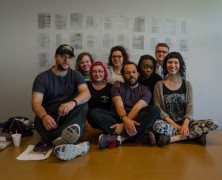
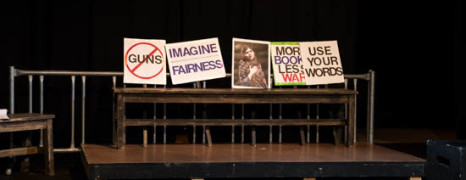
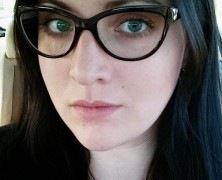
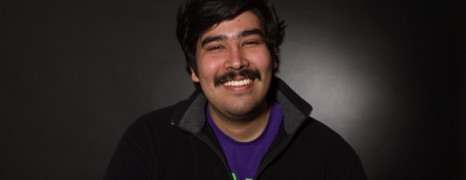
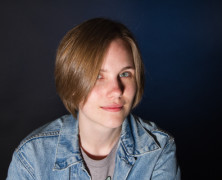
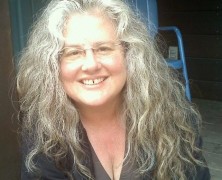
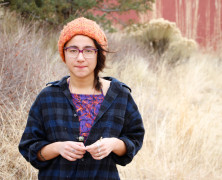
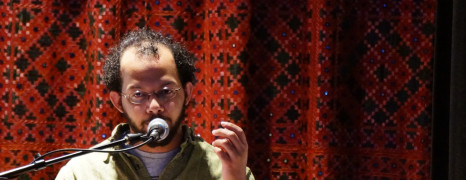
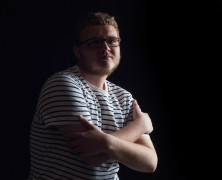
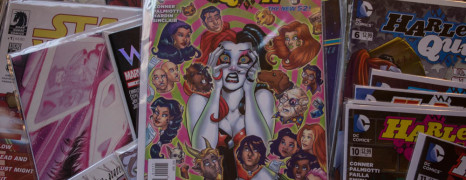
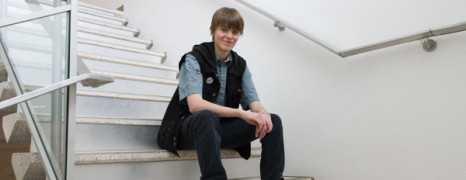
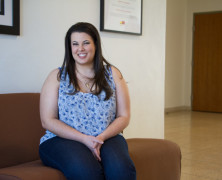
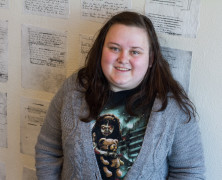
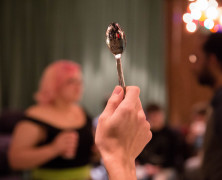
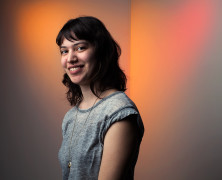


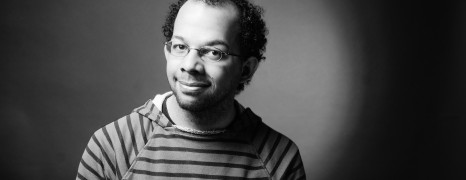

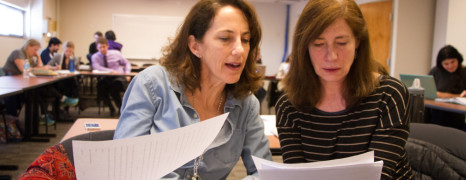
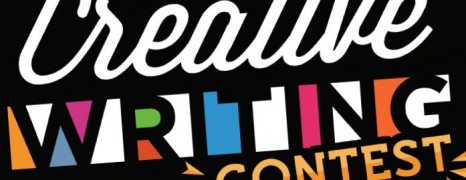
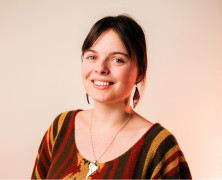
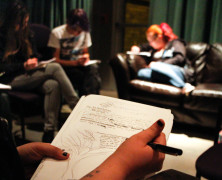
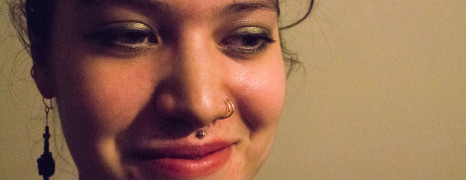
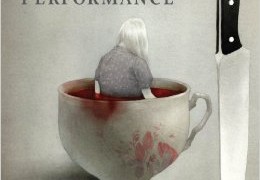
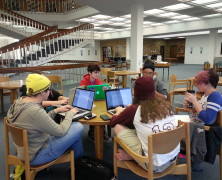
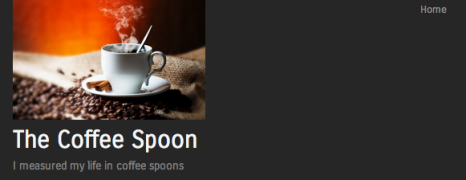
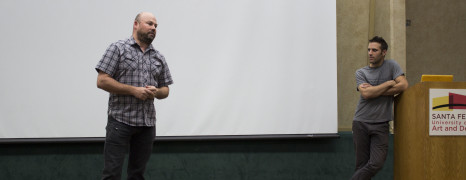
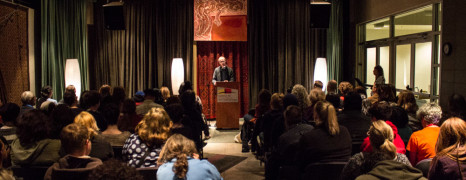

 Jackalope Magazine is the student magazine of Santa Fe University of Art and Design. Building on the interdisciplinary nature of our education, we aim to showcase the talent of our university and character of our city.
Jackalope Magazine is the student magazine of Santa Fe University of Art and Design. Building on the interdisciplinary nature of our education, we aim to showcase the talent of our university and character of our city.
Recent Comments